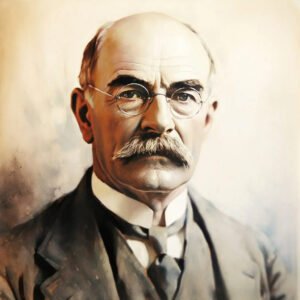**Rudyard Kipling**
Born: 1865
Died: 1936
Rudyard Kipling's childhood was marked by hardship and disorder. The carefree days of chasing butterflies, marveling at rainbows under a vast blue sky, and playing games with friends were far from his reality. Instead, he endured physical labor and the commands of a harsh guardian. The vibrant hues of the horizon gradually faded from his young eyes. Yet, Kipling did not give up.
Do you know whom we are speaking about? You might be surprised to learn that this is Rudyard Kipling, the writer who won the Nobel Prize in Literature in 1907. And when Kipling's name is mentioned, the first thing that comes to mind is Mowgli—the wild child who befriended animals. Mowgli, Kipling's most captivating character, comes to life in his famous book, *The Jungle Book*, a masterpiece of storytelling.
Let’s revisit Kipling’s early years. Born on December 30, 1865, in Bombay (now Mumbai), India, he spent his earliest years there. However, Kipling hardly remembered those carefree days. At the tender age of five, he was sent to a primary school in Southsea, England. From then on, dark clouds loomed over his fate. He lived under the guardianship of a distant uncle, a man of great cruelty and coldness.
From morning to night, young Kipling was tasked with household chores. Even when he was exhausted, he could not express his distress. With no parents around to confide in, he endured silently. Seasons passed—spring arrived, painting the rhododendrons in vibrant colors, and the lilacs called for joy—but Kipling’s life saw no change.
After seven long years, now a twelve-year-old boy, Kipling was sent to the United Services College. Here, his life took a turn for the better. Free from the tyranny of his uncle, Kipling focused on his studies. Friends lent him support, and a cultural environment emerged where Kipling excelled in poetry recitation and essay writing. From a young age, he displayed a passion for literature, devouring works not only in English but also in German and French, albeit through translations.
After five years at the college, Kipling returned to India at seventeen. By then, the world around him had transformed, and the innocence of childhood was lost. As he entered adolescence, Kipling’s vision expanded, filled with a sense of wonder and mystery. He felt a strong urge to understand the world and mold himself into an honorable and cultured individual.
In Lahore, he secured a job at the *Civil and Military Gazette*, marking the beginning of his writing career. Soon, Kipling became a contributor to another publication, *The Pioneer*, where his essays and stories began to appear regularly. Thus, his childhood slipped away, replaced by the call of the wider world. Kipling preserved his childhood memories, weaving them into words that reached the hearts of readers everywhere.
In time, Rudyard Kipling became a distinguished writer, and his achievements culminated in the Nobel Prize in 1907. The recognition primarily honored his writings centered on nature and the wilderness. During the Nobel ceremony, the citation praised Kipling for his keen observational skills, originality of imagination, diversity of themes, and remarkable talent, qualities that set him apart.
We can only wonder if those sorrowful days of his distant childhood ever echoed in Kipling’s mind as melancholic notes on a violin. Perhaps, during such moments, he silently raised his clenched fists to the sky, vowing to transform his pain into strength—a promise that turned him into the resolute and remarkable individual we remember today.

